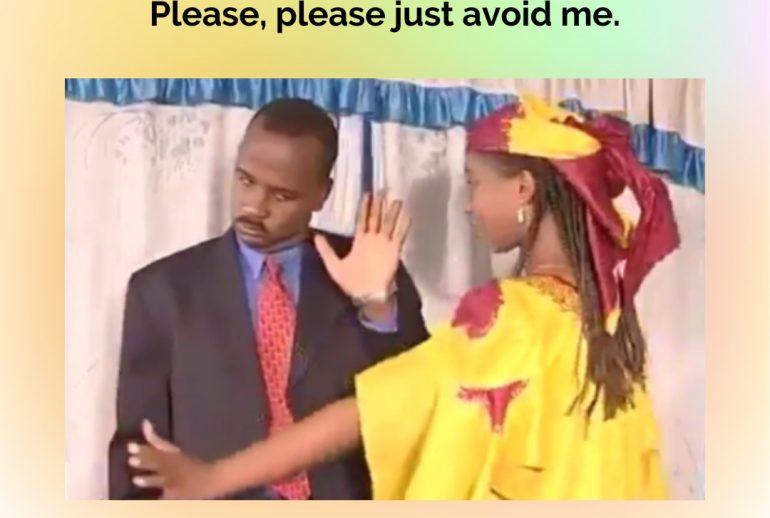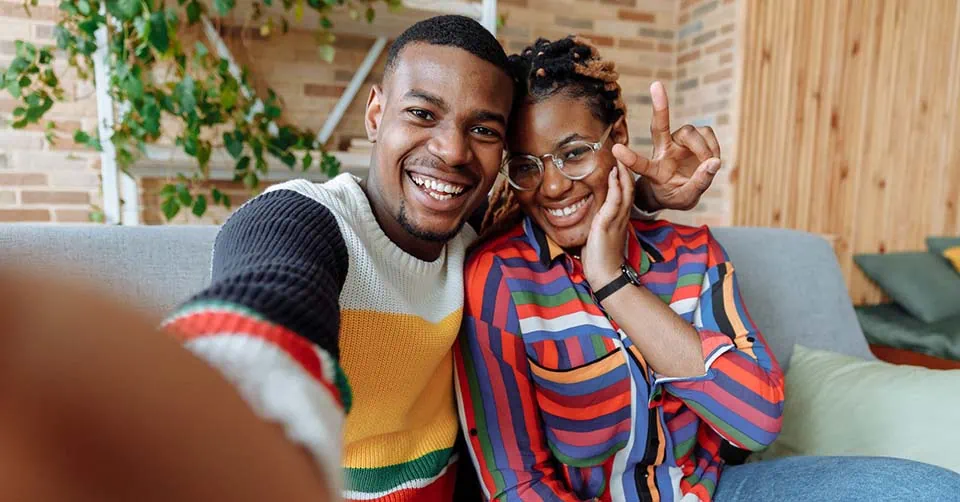OPINION
7 Ways To Be More Vulnerable In A Relationship
Published
5 months agoon

We hear it constantly: Relationships require you to “be vulnerable” with your partner. This advice is repeated so often that it has almost become background noise in dating. This is along with other common phrases like “communication is key” and “relationships take hard work.”
Despite being a buzzword, vulnerability is a complex concept. It’s also a trait that doesn’t come easily or naturally to everyone.
What does it mean to be vulnerable?
In relationships, being vulnerable means showing someone exactly who you are and how you feel without disguise, bravado, or ego defences, exposing yourself to the possibility of hurt or rejection.
Being vulnerable means you make a conscious decision not to hide yourself. This is risky because you can’t control how others will respond to you. It means others see who you truly are, and if they aren’t able to accept you, appreciate your complexity, or they judge or reject you, it hurts deeply.
Being vulnerable with someone means risking being your true self.
People struggle with vulnerability because they fear getting hurt, typically in the form of rejection, judgment, or betrayal from others. You may begin to put on a brave face, act indifferent, suppress emotions, or step into a role meant to protect yourself from these risks.
The irony is, when you do this, you end up robbing yourself of the intimacy, connection, community, and love of the people who have the bandwidth and capacity to accept you as you are.
How can you be emotionally vulnerable?
- Directly telling someone that you think they’re cool and are interested in getting to know them better
- Letting someone know that something they said hurt your feelings
- Telling someone when you’re feeling ashamed or embarrassed
- Acknowledging when you’ve made a mistake and apologizing for it
- Asking for feedback on a project you care a lot about and worked hard on
- Opening up to someone about an experience of trauma or hardship
- Asking someone for help
- Telling a friend that your relationship has been rocky lately and asking for support
- Listening to someone explain a way in which you’ve hurt them, without trying to explain what happened or defend your character
- Letting people know about your insecurities or struggles
- Allowing yourself to feel hopeful and excited about a budding relationship, even though things are still new and uncertain
- Setting a boundary with someone
- Talking openly about your negative emotions—such as anger, fear, disappointment, or jealousy—without trying to cover them up or deflect from them
- Telling someone about a time when someone made you feel small
- Believing and trusting in someone completely, putting your faith in them that they’ll come through for you
7 ways to be more vulnerable in a relationship

1. Get to know your inner world better
To show people your true self, you first need to know your true self. This begins with exploring yourself beyond your default attitudes. Pay attention to your knee-jerk reactions when something positive or negative happens. Ask yourself, “If I didn’t hide behind this reaction, is there more going on here for me?”
Allow yourself to recognize how you feel in different situations, tune in to your body, and practice saying how you genuinely feel about things out loud. It can be surprisingly powerful to say, “I feel angry toward my sister” or “I feel scared of being alone” because often, we don’t even allow ourselves to be vulnerable with ourselves.
2. Say how you really feel about things
Once you’re more in touch with your own emotions, start sharing them with others. Practice telling your partner how you really feel about things, even if it seems silly.
If you miss your partner, send them a text and let them know; if your partner hurt your feelings with a small comment this morning, tell them honestly how it felt. If you really enjoy hanging out with him/her, let them know.
3. Accept the risk
The truth is that being vulnerable means accepting the risk of getting hurt. This means you can’t always wait for a situation where you’re perfectly safe or certain that you won’t get judged or rejected.
There’s always a degree of risk involved when you’re genuine and honest. Even if you’re vulnerable and it doesn’t end up creating intimacy and connection, or it isn’t received well, that’s okay. Being vulnerable doesn’t guarantee that things will go your way in all your relationships.
Learn to practice acceptance for these moments and build tolerance for the emotions that may accompany them.
4. Work on healing your attachment wounds
The fear of abandonment or getting hurt by others often stems from past experiences where that very thing happened. These are sometimes known as attachment issues, and it can help to explore these wounds with a mental health professional.
The goal is to develop what’s known as a secure attachment style. A securely attached person tends to be much more comfortable with vulnerability. They know that it is OK to need or depend on others, and they value being needed in return.
Intimacy and vulnerability are not a challenge, as a securely attached individual has a strong sense of self and isn’t dictated by fear of rejection or a fear of losing themselves.
5. Invite feedback from others
Asking your partner (or anyone) to give you their honest thoughts about you, your work, or your behaviour is an intensely vulnerable act—but it’s also something that can lead to more intimacy and accountability in your relationship.
When asking for feedback, be approachable and accountable. Expressing yourself vulnerably while inviting feedback could improve your connections. It gives people a chance to express themselves and convey any roadblocks or areas of friction.
6. Be upfront about the things you want
Vulnerability in dating can simply look like prioritizing your truth. It isn’t just about pouring your heart out and sharing all your past traumas (though that can be part of it eventually). You can start with something as small as being open about exactly what you want from a potential relationship. Also, you can simply be radically honest with someone you’re going on a date with.
Try answering every question with a completely true answer. If your date wants to get coffee but you don’t like coffee, don’t agree to have coffee. If you want to take a walk around the park, say you want to take a walk around the park. The building blocks of vulnerability start with honesty.
7. Remember why you’re doing this
Finally, it’s important to remember that vulnerability isn’t about getting other people to like you more or really getting anything out of others.
We need to remember we’re not being vulnerable to get people to act a certain way toward us. It’s not a tool of manipulation. It’s a tool of liberation. We should do it for ourselves.
No matter how the situation unfolds after you open yourself up, know that you’ve already benefited—because you showed up as your full self.
There’s only one you, and you were born to experience who you are as fully as possible and as often as possible, free of masks, defences, disguises, and shields.
How to make a man feel vulnerable?
To encourage a man to be vulnerable with you, ask open-ended questions that explore his experiences, ambitions, and emotions. Demonstrate genuine curiosity, making it clear that you’re interested in understanding him on a deeper level without being intrusive.
The takeaway
Being vulnerable is a risk, but it pays dividends in our relationships by allowing others to get close to us and know us more fully. Even if it doesn’t come naturally to you, you can learn how to be vulnerable by practising small acts of emotional bravery whenever and wherever possible.
For more articles on relationships, check here.
You may like

As a Nigerian adult, you understand that December isn’t merely a festive season—it’s the ultimate billing battlefield. In this case, knowing how to avoid billing this December can be your financial lifeline.
The month transforms into an elaborate financial obstacle course where every social engagement becomes a potential wallet-draining experience.
Picture this: you’re suddenly expected to match expensive aso-ebi for your partner’s distant cousin’s wedding, shell out cash for elaborate office hangout festivities, purchase thoughtful gifts for an extensive network of friends and family, grab concert tickets for the hottest “detty December” events, and somehow maintain some semblance of financial sanity.
Each commitment is strategically designed to empty your bank account, with Sapa waiting eagerly in the wings to completely demolish your January savings.
The universe seems to have conspired with social expectations to orchestrate a complex financial challenge, transforming December into an unofficial billing Olympics where your wallet is the primary competitor.
But here’s the good news: you can become a strategic “shege survivor” by mastering how to avoid billing this December with calculated precision and smart financial manoeuvres.
In this comprehensive survival guide, we’ll explore tactical approaches to navigate the treacherous December spending landscape, ensuring you emerge victorious without sacrificing your financial stability or social reputation. Prepare to become the ultimate December financial ninja!
1. Always Complain Like It’s Your Birthright
Nobody wants to bill someone who complains every five minutes. If you consistently make a point of complaining about your financial situation whenever you get the chance, the likelihood of being asked for money will drop drastically.
The only exception is if you have people around you who are heartless and completely audacious—if that’s the case, there’s a solution in step two.
2. Trade Your Flashy Phone for a ‘Torchlight’
Do you see that iPhone 14 Pro Max of yours? That big phone that attracts unnecessary attention? It’s essentially a billboard screaming, “I’m open for billing!”
To avoid billing, sell it and invest the money in preparing for next year’s challenges. No one will suspect you of being a “billionaire in transit” if you’re using a humble Nokia torchlight or an old-school TECNO phone.
Picture this: someone asking you for money while you’re holding a phone that looks like it belongs in 2003. They might even feel sorry for you and give you some spare change.
The goal here is to avoid billing by making it clear you’re not the person with deep pockets.
3. Buy Okrika Clothes
As the saying goes at the “Okrika” stores, “na mumu dey go boutique.” Avoid billing by steering clear of designer clothes that scream wealth and immediately mark you as a target for requests.
Instead, buy “Okrika” (secondhand) clothes and proudly share how much you paid when people compliment you. Tell them, “You won’t believe how much this outfit cost; it was just 500 Naira!” and make sure to add, “I’m making do with the little I have…”
This strategy helps position you as the king or queen of thrift, ensuring that nobody dares to ask you for money or extravagant contributions.
4. Avoid Calls Like a Pro
Screen all your calls, and be strategic about who you answer. The call from your cousin in the village? We both know it’s not “Merry Christmas” they’re about to say—it’s more likely “I need money for the New Year.”
To avoid billing, activate your Do Not Disturb (DND) mode and only return calls from people who won’t ask for a handout.
If you must respond, use WhatsApp messages so you can carefully craft your excuses without feeling pressured.
5. Go Solo: Break Up With Your Partner
Let’s be real—being in a relationship is one of the major sources of billing in December. To avoid billing and enjoy some peace of mind, consider going solo this season.
Enjoy your money without worrying about shared expenses, and enter the New Year without emotional or financial baggage. You deserve it!
When you want to avoid billing in December, it isn’t just about saving money—it’s about preserving your sanity and entering January without the financial hangover.
These strategies will help you avoid billing and ensure a peaceful, financially secure holiday season. When you’re sipping zobo in the comfort of your home instead of crying over debt recovery meetings, remember to thank me.
If you found these tips helpful and want more, visit here. And remember not to fall in love this December!
OPINION
11 Ways To Build Emotional Connection With Your Woman
Published
2 months agoon
December 1, 2024
Building a deep emotional connection is crucial for lasting romantic relationships. Understanding how to build an emotional connection with a woman requires genuine effort, empathy, and consistent communication.
Building a strong emotional connection with your woman is more than just physical attraction or shared interests. Emotional intimacy is the glue that holds couples together.
Here are eleven practical ways to foster this deep connection:
1. Prioritise Quality Time
How to build emotional connection with a woman? One of the most effective ways is to prioritise quality time together. This means putting away distractions like phones and focusing on each other.
Engage in activities you both enjoy, whether it’s a shared hobby, a simple conversation, or a romantic dinner. These moments create lasting memories and strengthen your bond.

2. Active Listening
To truly understand your woman, you must listen actively. This involves paying full attention, asking clarifying questions, and reflecting on her feelings. Active listening goes beyond merely hearing words.
Avoid interrupting or formulating your response while she’s speaking. When learning how to build emotional connection with a woman, focus entirely on her when she speaks. Show that you value her thoughts and emotions.
Maintain eye contact. Put away digital devices. Avoid interrupting. Reflect back on what you’ve heard to demonstrate understanding. Show genuine interest in her experiences.
Ask follow-up questions that reveal you’re truly engaged. Validate her feelings without judgment. This approach creates a safe emotional space where she feels heard and respected.
3. Express Gratitude and Appreciation
Show your appreciation for your woman through words and actions. A simple “thank you” or a heartfelt compliment can go a long way.
Recognise her efforts, both big and small, and express gratitude for her presence in your life. This positive reinforcement strengthens your emotional connection.
4. Physical Touch and Emotional Affection
Physical touch is a powerful way to connect with your woman on an emotional level. This doesn’t necessarily mean intimate acts.
Simple gestures like holding hands, unexpected hugs, and gentle touches on the arm, hair, and neck can convey love and affection. These physical cues deepen your bond and create a sense of emotional security and intimacy.
Understanding how to build emotional connection with a woman involves recognising her unique affection preferences. Some women appreciate frequent physical contact, while others prefer occasional, meaningful gestures.

5. Open and Intentional Communication
Open and honest communication is essential for a healthy relationship. Share your thoughts, feelings, and fears with vulnerability. Create a safe space where she can express herself without judgment. By being open and honest, you build trust and intimacy.
Communication is the cornerstone of emotional intimacy. Learn her communication style. Some women prefer direct conversations, while others appreciate subtle emotional nuance.
When discovering how to build emotional connection with a woman, communicate regularly and meaningfully. Share your thoughts, feelings, and daily experiences. Create moments of genuine conversation beyond surface-level interactions.
6. Surprise Her with Thoughtful Gestures
Small acts of kindness can have a significant impact on your emotional connection. Surprise her with a thoughtful gift, plan a romantic getaway, or simply leave a heartfelt note.
These unexpected gestures show that you care and are thinking of her.
7. Celebrate Milestones Together
Celebrate life’s milestones, both big and small, together. Whether it’s a birthday, an anniversary, or a personal achievement, these moments create shared experiences and strengthen your bond.
8. Express Vulnerability
Emotional connections deepen when partners share authentic feelings. Men often struggle with vulnerability, but it’s essential when understanding how to build an emotional connection with a woman. Share your fears, dreams, and personal challenges.
Demonstrate emotional intelligence by opening up about your inner world. Talk about your insecurities and past experiences. This transparency invites her to connect more deeply and builds mutual trust.
9. Show Consistent Emotional Support
Support goes beyond physical assistance. This means you have to prioritise her emotional landscape. Be present during her challenging times.
Offer comfort without attempting to fix everything. Listen empathetically. Validate her emotions. Demonstrate that you’re a reliable emotional anchor she can depend on during difficult moments.
10. Cultivate Shared Experiences
Shared experiences create emotional memories. Plan activities that allow genuine connection. Try new experiences together. Take classes, travel, or explore mutual interests.
These shared moments become emotional touchstones in your relationship. They create opportunities for deeper understanding and mutual growth when learning how to build emotional connection with a woman.

11. Practice Emotional Empathy
Empathy transforms relationships. Put yourself in her emotional shoes. Understand her perspective without judgment. Recognise her emotional triggers and respond with compassion.
When mastering how to build emotional connection with a woman, emotional intelligence becomes your greatest asset. Validate her feelings, even when they differ from your perspective.
Conclusion
Building an emotional connection requires continuous effort, patience, and genuine commitment. These strategies provide a roadmap for creating deeper, more meaningful romantic relationships.
Remember that every woman is unique. What works for one might not work perfectly for another. Stay adaptable, communicate openly, and approach emotional connection with sincerity and respect.
By implementing these strategies consistently, you’ll create a profound emotional bond that transcends surface-level interactions, fostering a relationship built on trust, understanding, and genuine love.
If you found this article helpful, click here to check out more.

Arguments in relationships test every couple’s communication skills. They reveal deeper emotional dynamics. Healthy partnerships transform conflicts into opportunities for understanding.
Navigate arguments in relationships with strategic approaches. Stop escalation before it destroys the connection. Recognize that disagreements happen naturally. Your response determines relationship quality.
These relationship arguments require emotional intelligence. Listen actively. Control reactive responses. Use compassionate language. Avoid accusatory statements. Show genuine respect.
Understand that arguments in relationships aren’t battles to win. They’re conversations to understand. Each disagreement offers a chance to strengthen bonds. Develop mutual empathy.
The final key to managing arguments in relationships involves staying calm. Take deep breaths. Pause when emotions run high. Focus on solutions, not problems.
Successful couples treat arguments as growth opportunities. They communicate openly and respect each other’s perspectives. They commit to mutual understanding.
Choose connection over being right. Transform conflicts into moments of intimacy and trust.
Below are 6 tips you can use to de-escalate arguments in relationships:
1. Take a Break
Arguments in relationships can quickly spiral out of control. When conversations become heated, take a strategic timeout. Step away from the intense moment.
Give yourself space to reset emotionally. Take a walk to clear your mind. Listen to calming music. Practice meditation techniques. Breathe deeply and center yourself.
The goal of taking a break during arguments in relationships is emotional regulation. Return to the conversation when both partners feel calm and rational. This approach prevents saying hurtful things in the heat of the moment.
2. Active Listening
Mastering active listening transforms arguments in relationships. When your partner speaks, give full attention. Silence your inner defensive voice. Avoid interrupting or preparing counterarguments. Focus entirely on understanding their perspective.
Ask clarifying questions. Repeat what you’ve heard to ensure comprehension. Show genuine interest in your partner’s feelings. Demonstrate that you value their emotional experience.
3. Use “I” Statements
Language matters in arguments in relationships. Replace blame with personal vulnerability. Instead of accusatory statements like “You always ignore me,” express your feelings directly. Say, “I feel lonely and disconnected when we don’t communicate.”
“I” statements reduce defensiveness. They invite empathy and understanding. They transform potential conflicts into opportunities for a deeper connection.
4. Avoid Personal Attacks
Arguments in relationships should never become character assassinations. Stick strictly to the current issue. Avoid bringing up past mistakes or criticizing your partner’s personality. Focus on resolving the specific problem at hand.
Maintain respect. Treat your partner with kindness, even during disagreements. Your goal is collaborative problem-solving, not winning a battle.
5. Find Common Ground
Every argument contains potential for understanding. Look for areas of agreement, no matter how small. Acknowledge shared feelings or goals. Build a bridge of mutual understanding.
Collaborative approaches transform arguments in relationships from confrontations to conversations. Work together as a team. Seek solutions that satisfy both partners.
6. Seek Professional Help
Persistent communication challenges require professional intervention. A qualified therapist can provide:
- Objective communication strategies
- Tools for emotional regulation
- Insights into underlying relationship dynamics
- Personalized conflict resolution techniques
Professional guidance helps couples break destructive communication patterns. It provides skills for healthier, more understanding relationships.
Transforming Conflicts
Arguments in relationships are growth opportunities. They test and strengthen emotional bonds. By approaching conflicts with empathy, respect, and strategic communication, couples can turn challenges into moments of deeper connection.
Disagreements are normal. Respect is essential. Love is a continuous journey of understanding.
Click here to read more articles on relationships.
Latest


5 Things To Expect In Afrobeats In 2025
Afrobeats is poised to reach unprecedented heights in 2025 as Nigerian music continues its remarkable global ascent. The genre’s explosive...


Here Are The 7 Most Ancient Countries On Earth
The oldest countries in the world stand as remarkable testaments to human civilisation, each containing landscapes and monuments that narrate...


Why Self-Reflection Is More Important Than Resolutions
Millions of people embark on a yearly ritual: they sit down with a notebook and pen, eager to craft a...


Nollywood Director, Kemi Adetiba Teases King Of Boys 3
Nollywood director Kemi Adetiba has revealed that another instalment of King of Boys will be released on December 25, 2025....


John McEnroe Says He Can Be The Commissioner Tennis Needs Amid Doping Crisis
Recent doping controversies involving top players have not damaged tennis’s reputation, but John McEnroe believes that appointing a single commissioner...


“Everybody Loves Jenifa” Becomes Nollywood’s Highest-Grossing Film Of All Time
Nollywood filmmaker Funke Akindele has achieved a historic milestone with her latest film, “Everybody Loves Jenifa.” The film has officially...


FG To Premiere TV Series, “Hidden Riches” On Mining Sector On January 25
Nigeria’s Federal Government will launch an ambitious television drama series focused on the nation’s mining sector, premiering “Hidden Riches” on...


Qing Madi Delivers A Soulful Performance Of “Favourite Pyscho”
Rising Afro-RnB sensation Qing Madi launches into 2025 with a mesmerising performance on the prestigious COLOURS platform, showcasing her latest...


Taiwo Awoniyi’s First Goal Of The Season Seals Nottingham Forest’s Win Over Wolves
Taiwo Awoniyi made a triumphant return to Premier League action. He scored in stoppage time to help Nottingham Forest crush...


Tems, Ayo Edebiri, Wizkid & More Nominated For The 56th NAACP Image Awards
The 56th NAACP Image Awards have unveiled their nominations. It highlights various exceptional talents. These talents include Nigerian stars Tems,...
-Ad-




Funke Akindele Breaks Records Again As “Everybody Loves Jenifa” Surpasses ₦1 Billion In 12 Days

Funke Akindele’s “Everybody Loves Jenifa” Rakes Box Office With ₦511 Million In Just 12 Days

Police Deny Knowledge & Investigation Of VeryDarkMan’s Missing N180m

CKay Tops The List Of RIAA Best-Selling Nigerian Artists

Netflix Struggles In Nigeria With Only About 300k Subscribers – Comedian AY

Toyosi Etim-Effiong Says She Doesn’t Trust Her Husband 100%

Something About Nigeria Drains Your Excellence – Adekunle Gold

How To Avoid Your Village People This Holiday Season

5 Ways To Stay Healthy This Christmas Season














